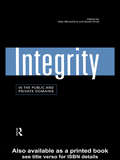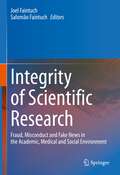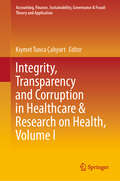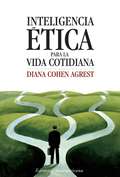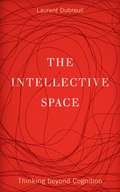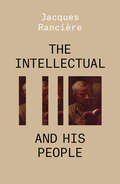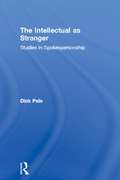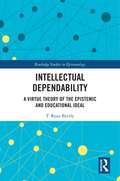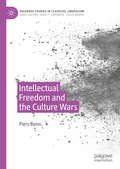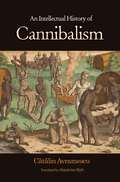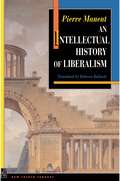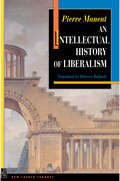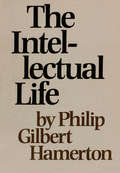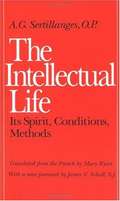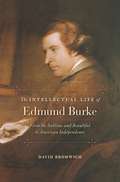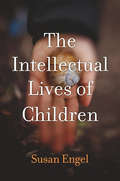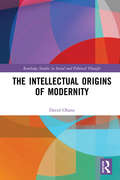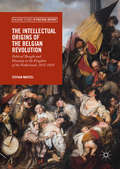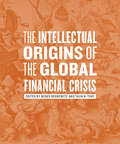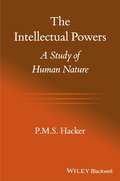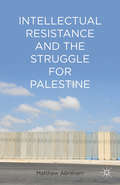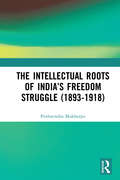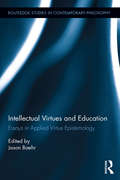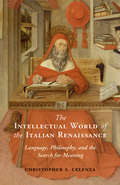- Table View
- List View
Integrity in the Public and Private Domains
by David Vines Edited by Alan MontefioreIntegrity in the Private and Public Domains explores the issue of public and private integrity in politics, the media, health, science, fund-raising, the economy and the public sector. Over twenty essays by well-known figures such as Amelie Rorty, David Vines, the late Hugo Gryn, Alan Montefiore and Hilary Lawson present a compelling insight into debates over integrity today. A key chapter of the book concerns the highly publicised donation to Oxford University by Gert-Rudolf Flick, an issue which attracted wide media attention by raising questions of fund-raising and the holocaust.
Integrity of Scientific Research: Fraud, Misconduct and Fake News in the Academic, Medical and Social Environment
by Joel Faintuch Salomão FaintuchThis book provides a scientific and ethical approach to all forms of fraud and misconduct focusing on a scholarly however practice-oriented description of the problems, roots and potential solutions.Organized in dedicated parts, an international team of experts systematically analyzes the most prevalent forms of misconduct, ghost writing, pseudo-science, dubious trials, predatory journals, fake news, mistreatment and harassment, in research, publications, at academic institutions, and in the professional and healthcare environment. A special focus is given to corrective interventions and the role of prevention, education and training. Comprehensive in its scope, the book offers an easy-to-read overview along with a number of real cases for experienced and novice personnel alike. The significance of scientific integrity and research ethics increased during the last couple of years and ethic committees and offices have become an integral part at universities, hospitals, research institutions, government agencies and major private organizations all over the world. Thus, this book provides an indispensable, comprehensive overview across disciplines and for everybody working in research and affiliated institutions.
Integrity, Transparency and Corruption in Healthcare & Research on Health, Volume I (Accounting, Finance, Sustainability, Governance & Fraud: Theory and Application)
by Kıymet Tunca ÇalıyurtThis book grapples with the numerous risks organizations face in order to succeed. These include economic risks, disaster risks, supply-chain risks, regulatory risks, and technology risks, all of which affect organizations in different ways and in varying degrees. Referencing Mahatma Gandhi’s seven unethical behaviors in the business world—wealth without work, pleasure without conscience, knowledge without character, commerce without morality, science without humanity, religion without sacrifice, and politics without principle—the authors analyze the healthcare sector. As competition in the health sector increases, there has also been a rise in unethical behavior. Corruption in the health sector results in severe consequences as it could affect the health of millions. This volume explores fraud schemes and cases, legislation to avoid cheating, lack of law, transparency, ethical issues, corporate governance and transparency in the health and pharmaceutical sector bringing together the perspectives of practitioners, professionals, as well as academic authors.
Inteligencia ética para la vida cotidiana
by Diana Cohen AgrestTextos breves de ética de divulgación, con un enfoque laico y plural,expresados en un lenguaje coloquial y escritos con el propósito de queel lector pueda reconocerse en ellos. Una invitación a pensar crítica y reflexivamente, en torno a nuestrasvidas. Conciliando lo que creemos ser, lo que somos y lo que aspiramos aser.
The Intellective Space
by Laurent DubreuilThe Intellective Space explores the nature and limits of thought. It celebrates the poetic virtues of language and the creative imperfections of our animal minds while pleading for a renewal of the humanities that is grounded in a study of the sciences.According to Laurent Dubreuil, we humans both say more than we think and think more than we say. Dubreuil's particular interest is the intellective space, a space where thought and knowledge are performed and shared. For Dubreuil, the term "cognition" refers to the minimal level of our mental operations. But he suggests that for humans there is an excess of cognition due to our extensive processing necessary for verbal language, brain dynamics, and social contexts. In articulating the intellective, Dubreuil includes "the productive undoing of cognition."Dubreuil grants that cognitive operations take place and that protocols of experimental psychology, new techniques of neuroimagery, and mathematical or computerized models provide access to a certain understanding of thought. But he argues that there is something in thinking that bypasses cognitive structures. Seeking to theorize with the sciences, the book's first section develops the "intellective hypothesis" and points toward the potential journey of ideas going beyond cognition, after and before computation. The second part, "Animal Meditations," pursues some of the consequences of this hypothesis with regard to the disparaged but enduring project of metaphysics, with its emphasis on categories such as reality, humanness, and the soul.
The Intellectual and His People: Staging the People Volume 2
by Jacques RanciereFollowing the previous volume of essays by Jacques Rancière from the 1970s, Staging the People: The Proletarian and His Double, this second collection focuses on the ways in which radical philosophers understand the people they profess to speak for. The Intellectual and His People engages in an incisive and original way with current political and cultural issues, including the "discovery" of totalitarianism by the "new philosophers," the relationship of Sartre and Foucault to popular struggles, nostalgia for the ebbing world of the factory, the slippage of the artistic avant-garde into defending corporate privilege, and the ambiguous sociological critique of Pierre Bourdieu. As ever, Rancière challenges all patterns of thought in which one-time radicalism has become empty convention.
The Intellectual as Stranger: Studies in Spokespersonship (Routledge Studies in Social and Political Thought #Vol. 30)
by Dick PelsThe Intellectual as Stranger explores the historical association between images of the intellectual and those of the stranger, or the outsider to society. Using detailed case-studies, Pels examines the ambiguous strangerhood of political intellectuals such as Marx, Durkheim, Sorel, Freyer and Hendrik de Man.
Intellectual Dependability: A Virtue Theory of the Epistemic and Educational Ideal (Routledge Studies in Epistemology)
by T. Ryan ByerlyIntellectual Dependability is the first research monograph devoted to addressing the question of what it is to be an intellectually dependable person—the sort of person on whom one’s fellow inquirers can depend in their pursuit of epistemic goods. While neglected in recent scholarship, this question is an important one for both epistemology—how we should conceptualize the ideal inquirer—and education—how we can enable developing learners to grow toward this ideal. The book defends a virtue theory according to which being an intellectually dependable person is distinctively a matter of possessing a suite of neglected virtues called "the virtues of intellectual dependability" that are themselves distinctively concerned with promoting epistemic goods in others’ inquiries. After defending the existence and educational significance of these virtues as a group, the book turns toward the project of identifying and conceptualizing several specific instances of these virtues in detail. Virtues discussed include intellectual benevolence, intellectual transparency, communicative clarity, audience sensitivity, and epistemic guidance. In each case, an interdisciplinary treatment of the nature of the virtue and its relationship to other virtues, vices, and personality features is offered, drawing especially on relevant research in Philosophy and Psychology. The book concludes with a chapter devoted to identifying distinctive ways these virtues of intellectual dependability are manifested when it is inquiring communities, rather than individuals, that occupy the position of intellectual dependence. By directing attention to the ideal of intellectual dependability, the book marks a novel turn of scholarly interest explicitly toward a neglected dimension of the ideal inquirer that will inform both epistemological theorizing and educational practice.
Intellectual Freedom and the Culture Wars (Palgrave Studies in Classical Liberalism)
by Piers BennThis book offers a sustained and vigorous defence of free expression and objective enquiry situated in the context of the current culture wars. In the spirit of J. S. Mill, Benn investigates objections to the ideal of free expression in relation to harm and offence, reaching broadly liberal conclusions with reference to recent examples of attempts to curb free speech on university campuses. Accepting that some expressions can cause non-physical harm, Benn also considers objections to free speech based on certain understandings of power and privilege. In its exploration and rejection of arguments against the possibility of obtaining objective truth, the book navigates hotly contested fields of contemporary debate, including feminism and identity politics. It challenges the dogma of social constructionism and examines current notions of identity, arguing that a case for fairness can be made without appealing to them. Offering a qualified endorsement of friendship between ideological opponents, Benn highlights common obstacles to civil and rational discussions, concluding with a rational, moral, and broadly spiritual solution to the cultural combat that monopolises present-day society.
An Intellectual History of Cannibalism
by Cătălin AvramescuThe cannibal has played a surprisingly important role in the history of thought--perhaps the ultimate symbol of savagery and degradation-- haunting the Western imagination since before the Age of Discovery, when Europeans first encountered genuine cannibals and related horrible stories of shipwrecked travelers eating each other. An Intellectual History of Cannibalism is the first book to systematically examine the role of the cannibal in the arguments of philosophers, from the classical period to modern disputes about such wide-ranging issues as vegetarianism and the right to private property. Catalin Avramescu shows how the cannibal is, before anything else, a theoretical creature, one whose fate sheds light on the decline of theories of natural law, the emergence of modernity, and contemporary notions about good and evil. This provocative history of ideas traces the cannibal's appearance throughout Western thought, first as a creature springing from the menagerie of natural law, later as a diabolical retort to theological dogmas about the resurrection of the body, and finally to present-day social, ethical, and political debates in which the cannibal is viewed through the lens of anthropology or invoked in the service of moral relativism. Ultimately, An Intellectual History of Cannibalism is the story of the birth of modernity and of the philosophies of culture that arose in the wake of the Enlightenment. It is a book that lays bare the darker fears and impulses that course through the Western intellectual tradition.
An Intellectual History of Liberalism (New French Thought Series #1)
by Pierre ManentHighlighting the social tensions that confront the liberal tradition, Pierre Manent draws a portrait of what we, citizens of modern liberal democracies, have become. For Manent, a discussion of liberalism encompasses the foundations of modern society, its secularism, its individualism, and its conception of rights. The frequent incapacity of the morally neutral, democratic state to further social causes, he argues, derives from the liberal stance that political life does not serve a higher purpose. Through quick-moving, highly synthetic essays, he explores the development of liberal thinking in terms of a single theme: the decline of theological politics. The author traces the liberal stance to Machiavelli, who, in seeking to divorce everyday life from the pervasive influence of the Catholic church, separated politics from all notions of a cosmological order. What followed, as Manent demonstrates in his analyses of Locke, Hobbes, Rousseau, Guizot, and Constant, was the evolving concept of an individual with no goals outside the confines of the self and a state with no purpose but to prevent individuals from dominating one another. Weighing both the positive and negative effects of such a political arrangement, Manent raises important questions about the fundamental political issues of the day, among them the possibility of individual rights being reconciled with the necessary demands of political organization, and the desirability of a government system neutral about religion but not about public morals.
An Intellectual History of Liberalism
by Pierre Manent Rebecca BalinskiHighlighting the social tensions that confront the liberal tradition, Pierre Manent draws a portrait of what we, citizens of modern liberal democracies, have become. For Manent, a discussion of liberalism encompasses the foundations of modern society, its secularism, its individualism, and its conception of rights. The frequent incapacity of the morally neutral, democratic state to further social causes, he argues, derives from the liberal stance that political life does not serve a higher purpose. Through quick-moving, highly synthetic essays, he explores the development of liberal thinking in terms of a single theme: the decline of theological politics. The author traces the liberal stance to Machiavelli, who, in seeking to divorce everyday life from the pervasive influence of the Catholic church, separated politics from all notions of a cosmological order. What followed, as Manent demonstrates in his analyses of Locke, Hobbes, Rousseau, Guizot, and Constant, was the evolving concept of an individual with no goals outside the confines of the self and a state with no purpose but to prevent individuals from dominating one another. Weighing both the positive and negative effects of such a political arrangement, Manent raises important questions about the fundamental political issues of the day, among them the possibility of individual rights being reconciled with the necessary demands of political organization, and the desirability of a government system neutral about religion but not about public morals.
The Intellectual Life
by Philip Gilbert HamertonThis classic exploration of the intellectual life has fully retained its unique value since initial publication in 1904, and it is a distinct satisfaction to present it for the pleasure and edification of discerning readers. No subsequent work fully compares to this rare mixture of personal insight, ethics, taste, psychology, and common sense. Philip Gilbert Hamerton bestowed upon it his long experience as a writer and artist, his enviable breadth of knowledge, and his elegance of literary style. The result is a remarkable work, expressing intimately the mind and personality of the author, yet universal in its application to all those with a love of intellectual pursuits. The publisher takes a great deal of pleasure in offering this work to the public.
The Intellectual Life
by Philip Gilbert HamertonThis classic exploration of the intellectual life has fully retained its unique value since initial publication in 1904, and it is a distinct satisfaction to present it for the pleasure and edification of discerning readers. No subsequent work fully compares to this rare mixture of personal insight, ethics, taste, psychology, and common sense. Philip Gilbert Hamerton bestowed upon it his long experience as a writer and artist, his enviable breadth of knowledge, and his elegance of literary style. The result is a remarkable work, expressing intimately the mind and personality of the author, yet universal in its application to all those with a love of intellectual pursuits. The publisher takes a great deal of pleasure in offering this work to the public.
The Intellectual Life: Its Spirit, Conditions, Methods
by A. G. Sertillanges Mary RyanThis is above all a practical book. It discusses with a wealth of illustration and insight such subjects as the organization of the intellectual worker's time, materials, and his life; the integration of knowledge and the relation of one's specialty to general knowledge; the choice and use of reading; the discipline of memory; the taking of notes, their classification and use; and the preparation and organization of the final production.
The Intellectual Life of Edmund Burke: From The Sublime And Beautiful To American Independence
by David BromwichThis intellectual biography examines the first three decades of Burke's professional life. His protest against the cruelties of English society and his criticism of all unchecked power laid the groundwork for his later attacks on abuses of government in India, Ireland, and France.
The Intellectual Lives of Children
by Susan EngelA look inside the minds of young children shows how we can better nurture their abilities to think and grow.Adults easily recognize children’s imagination at work as they play. Yet most of us know little about what really goes on inside their heads as they encounter the problems and complexities of the world around them. In The Intellectual Lives of Children, Susan Engel brings together an extraordinary body of research to explain how toddlers, preschoolers, and elementary-aged children think. By understanding the science behind how children observe their world, explain new phenomena, and solve problems, parents and teachers will be better equipped to guide the next generation to become perceptive and insightful thinkers.The activities that engross kids can seem frivolous, but they can teach us a great deal about cognitive development. A young girl’s bug collection reveals important lessons about how children ask questions and organize information. Watching a young boy scoop mud can illuminate the process of invention. When a child ponders the mystery of death, we witness how children build ideas. But adults shouldn’t just stand around watching. When parents are creative, it can rub off on their children. Engel shows how parents and teachers can stimulate children’s curiosity by presenting them with mysteries to solve.Unfortunately, in our homes and schools, we too often train children to behave rather than nurture their rich and active minds. This focus is misguided, since it is with their first inquiries and inventions—and the adult world’s response to them—that children lay the foundation for a lifetime of learning and good thinking. Engel offers readers a scientifically based approach that will encourage children’s intellectual growth and set them on the path of inquiry, invention, and ideas.
The Intellectual Origins of Modernity (Routledge Studies in Social and Political Thought)
by David OhanaThe Intellectual Origins of Modernity explores the long and winding road of modernity from Rousseau to Foucault and its roots, which are not to be found in a desire for enlightenment or in the idea of progress but in the Promethean passion of Western humankind. Modernity is the Promethean passion, the passion of humans to be their own master, to use their insight to make a world different from the one that they found, and to liberate themselves from their immemorial chains. This passion created the political ideologies of the nineteenth century and made its imprint on the totalitarian regimes that arose in their wake in the twentieth. Underlying the Promethean passion there was modernity—humankind's project of self-creation—and enlightenment, the existence of a constant tension between the actual and the desirable, between reality and the ideal. Beneath the weariness, the exhaustion and the skepticism of post-modernist criticism is a refusal to take Promethean horizons into account. This book attests the importance of reason, which remains a powerful critical weapon of humankind against the idols that have come out of modernity: totalitarianism, fundamentalism, the golem of technology, genetic engineering and a boundless will to power. Without it, the new Prometheus is liable to return the fire to the gods.
The Intellectual Origins of the Belgian Revolution: Political Thought and Disunity in the Kingdom of the Netherlands, 1815-1830 (Palgrave Studies in Political History)
by Stefaan MarteelThis book explores the political ideas of the Belgian Revolution of 1830, which led to the break-up of the Restoration state of the ‘united’ Kingdom of the Netherlands. It uncovers the origins of liberalism and political Catholicism in the Southern Netherlands in the wake of the French Revolution, and traces the development of political language in the context of the tensions between the Northern and Southern part of the united Netherlands. It shows how differences in ‘Dutch’ and ‘Belgian’ political and intellectual history resulted in different understandings of essential political concepts such as ‘sovereignty’ and ‘balance of powers’, as well as of the nature of the constitutional order of 1815. Finally, it traces the emergence of Belgian nationalism within the discourse of opposition against the government. Stefaan Marteel therefore provides a fresh perspective on the intellectual background of the rise of the nation-state in the nineteenth century.
The Intellectual Origins of the Global Financial Crisis
by Taun N. Toay Roger BerkowitzCommentary on the financial crisis has offered technical analysis, political finger pointing, and myriad economic and political solutions. But rarely do these investigations reach beyond the economic and political causes of the crisis to explore their underlying intellectual grounds. The essays in this volume delve deeper into the cultural and intellectual foundations, philosophical ideas, political traditions, and economic movements that underlie the greatest financial crisis in nearly a century. Moving beyond traditional economic and political science approaches, these essays engage thinkers from Hannah Arendt to Max Weber and Adam Smith to Michel Foucault. With Arendt as a catalyst, the authors probe the philosophical as well as the cultural origins of the great recession. Orienting the volume is Arendt’s argument that past financial crises and also totalitarianism are rooted, at least in part, in the tendency for capital to expand its reach globally without regard to political and moral borders or limits. That politics is made subservient to economics names a cultural transformation that, in the spirit of Arendt, guides these essays in making sense of our present world. Including articles, interviews, and commentary from leading scholars and business executives, this volume offers views that are as diverse as they are timely. By reaching beyond “how” the crisis happened to “why” the crisis happened, the authors re-imagine the recent financial crisis and thus provide fresh thinking about how to respond.
The Intellectual Powers
by P. M. HackerThe Intellectual Powers is a philosophical investigation into the cognitive and cogitative powers of mankind. It develops a connective analysis of our powers of consciousness, intentionality, mastery of language, knowledge, belief, certainty, sensation, perception, memory, thought, and imagination, by one of Britain's leading philosophers. It is an essential guide and handbook for philosophers, psychologists, and cognitive neuroscientists.The culmination of 45 years of reflection on the philosophy of mind, epistemology, and the nature of the human personNo other book in epistemology or philosophy of psychology provides such extensive overviews of consciousness, self-consciousness, intentionality, mastery of a language, knowledge, belief, memory, sensation and perception, thought and imaginationIllustrated with tables, tree-diagrams, and charts to provide overviews of the conceptual relationships disclosed by analysisWritten by one of Britain's best philosophical mindsA sequel to Hacker's Human Nature: The Categorial FrameworkAn essential guide and handbook for all who are working in philosophy of mind, epistemology, psychology, cognitive science, and cognitive neuroscience
Intellectual Resistance and the Struggle for Palestine
by M. AbrahamBy positioning the late Edward Said's political interventions as a public intellectual on behalf of Palestinian populations living under Israeli occupation as a form of intellectual resistance, Abraham moves to consider forms of physical resistance, seeking to better understand the motivations of those who choose to turn their bodies into weapons.
The Intellectual Roots of India’s Freedom Struggle (1893-1918)
by Prithwindra MukherjeeMost people believe India’s struggle for independence to have begun with Mahatma Gandhi. Little credit goes to the proof that this call for a mass movement did not arise out of a void. For the past century and more, historians have overlooked the phase of twenty-five years of intense creative endeavour preceding and preparing for the Mahatma’s advent. The reason for this systematic omission has been the fundamentally radical nature of the revolutionary programme put to practice by Indian leaders of late nineteenth and early twentieth centuries. Jugantar was diametrically distinct from the dream of non-violence floated by the Mahatma and the Congress. Very well documented with inputs from Indian, European and American archives, the present study carefully straightenes out the origins – philosophical, historical and religious and intellectual, so to say – of Indian nationalism. From Rammohun to Sri Aurobindo, passing through Marx and Tagore, the full set of ideological views has been analysed here. Unknown up to this day, the sustained focus in this volume on the outlook and the activities of these revolutionaries inside India and abroad brings home the ‘very sophisticated understanding of the contemporary political reality’ that made their leader Jatindranath Mukherjee, the ‘right hand man’ of Sri Aurobindo, the very emblem of an epoch and its aspirations. Please note: Taylor & Francis does not sell or distribute the Hardback in India, Pakistan, Nepal, Bhutan, Bangladesh and Sri Lanka
Intellectual Virtues and Education: Essays in Applied Virtue Epistemology (Routledge Studies in Contemporary Philosophy)
by Jason BaehrWith its focus on intellectual virtues and their role in the acquisition and transmission of knowledge and related epistemic goods, virtue epistemology provides a rich set of tools for educational theory and practice. In particular, characteristics under the rubric of "responsibilist" virtue epistemology, like curiosity, open-mindedness, attentiveness, intellectual courage, and intellectual tenacity, can help educators and students define and attain certain worthy but nebulous educational goals like a love of learning, lifelong learning, and critical thinking. This volume is devoted to exploring the intersection between virtue epistemology and education. It assembles leading virtue epistemologists and philosophers of education to address such questions as: Which virtues are most essential to education? How exactly should these virtues be understood? How is the goal of intellectual character growth related to other educational goals, for example, to critical thinking and knowledge-acquisition? What are the "best practices" for achieving this goal? Can growth in intellectual virtues be measured? The chapters are a prime example of "applied epistemology" and promise to be a seminal contribution to an area of research that is rapidly gaining attention within epistemology and beyond.
The Intellectual World of the Italian Renaissance: Language, Philosophy, and the Search for Meaning
by Celenza Christopher S.In this book, Christopher Celenza provides an intellectual history of the Italian Renaissance during the long fifteenth century, from c. 1350-1525. His book fills a bibliographic gap between Petrarch and Machiavelli and offers clear case studies of contemporary luminaries, including Leonardo Bruni, Poggio Bracciolini, Lorenzo Valla, Marsilio Ficino, Angelo Poliziano, and Pietro Bembo. Integrating sources in Italian and Latin, Celenza focuses on the linked issues of language and philosophy. He also examines the conditions in which Renaissance intellectuals operated in an era before the invention of printing, analyzing reading strategies and showing how texts were consulted, and how new ideas were generated as a result of conversations, both oral and epistolary. The result is a volume that offers a new view on both the history of philosophy and Italian Renaissance intellectual life. It will serve as a key resource for students and scholars of early modern Italian humanism and culture.
